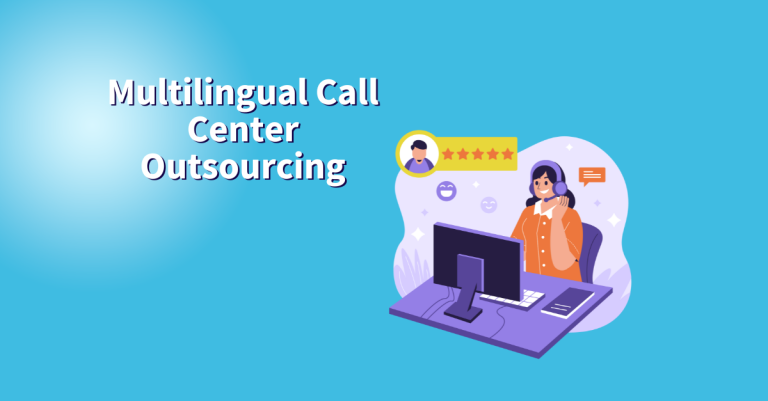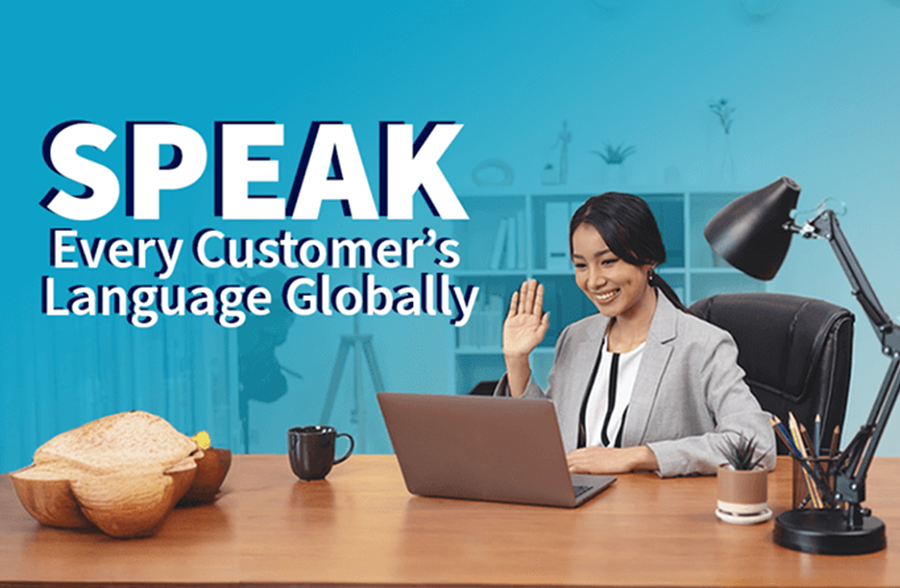Schedule a FREE call with our outsourcing expert now and get a precise quotation that meets your requirements. Don't wait - get started today!
Every language carries history, values, and identity. When businesses communicate in a customer’s native language, they aren’t just translating words—they’re bridging cultures and creating meaningful connections.
Expanding a business globally is more than just selling to international customers. It’s about building trust. And what’s the first step? Speaking their language. Customers feel more comfortable and valued when interacting in a language they understand.
Many small and medium-sized enterprises (SMEs) struggle to provide multilingual customer support. Hiring in-house multilingual staff is expensive and hard to manage. This is where multilingual call center outsourcing comes in. But how do you ensure it works for your business? Let’s explore.
Multilingual Call Center Outsourcing Is More Than Just Translation
Many assume that multilingual call centers only translate conversations. That’s a misconception. There’s much more to it!
1. Native Language vs. Literal Translation
A word-for-word translation often loses meaning. While an automated translator can convert text, it fails to capture the nuances that make conversations natural. Customers prefer talking to customer service representatives who understand local expressions, humor, and tone.
Imagine calling for support and hearing responses that sound robotic or awkward—it creates frustration instead of trust. Native-speaking agents ensure conversations flow smoothly and feel genuine.
2. Cultural Adaptation Matters
Customers want more than just language support—they want a service that respects their culture. This includes how to address customers, respond to complaints, and even handle silence in conversations. For example, in some cultures, direct communication is preferred, while in others, a more indirect and polite approach is expected. A skilled call center company trains agents to adapt to these cultural differences, ensuring that every interaction feels personal and respectful.
3. Industry-Specific Language
A retail business requires different communication styles than a healthcare provider. A strong multilingual call center company ensures agents are trained in industry-specific terminology. In the healthcare industry, for instance, accuracy in language is critical—miscommunication can lead to serious consequences.
Meanwhile, an e-commerce business may need agents who understand product descriptions, return policies, and promotions. Proper training ensures customers receive clear, relevant, and professional responses tailored to their needs.
4. The Role of Emotional Intelligence
It’s not just about what is said—it’s about how it’s said. A good call center company trains agents to recognize tone and emotions across languages. A frustrated customer in one country may express their concerns differently than in another, and an agent must know how to respond appropriately. Understanding emotions, showing empathy, and using the right tone contribute to a positive customer experience. After all, great customer service isn’t just about solving problems—it’s about making customers feel heard and valued.
The Untapped Power of Multilingual Call Center Services for SMEs
Most SMEs assume multilingual services are for large corporations. But that’s not true. In fact, smaller businesses can gain even greater advantages by offering multilingual customer support. By speaking their customers’ language, SMEs can build trust, improve service quality, and expand into new markets—without the massive overhead of in-house multilingual teams.
1. Competitive Edge in Niche Markets
While big brands focus on significant languages, smaller businesses can dominate niche markets. Offering support in regional dialects or less common languages can make a company stand out. Many customers in underserved regions struggle to find businesses that cater to their language needs. By filling this gap, SMEs can build a loyal customer base and become the go-to provider in specific markets. This increases sales and strengthens brand loyalty in communities that often feel overlooked.
2. Instant Connection with Global Customers
Customers feel comfortable when a business speaks their native language. This reduces hesitation and builds trust faster. When a potential buyer contacts a company and is greeted in their own language, they feel valued and understood immediately. This emotional connection encourages purchases, reduces abandoned inquiries, and leads to repeat business. In contrast, forcing customers to navigate a language barrier can result in frustration and lost sales.
3. Faster Problem Resolution
Miscommunication delays solutions. A well-trained multilingual customer support team ensures customers get answers the first time—without needing multiple calls. When customers struggle to explain their issues in a second language, it leads to misunderstandings, repeated clarifications, and longer resolution times.
With native-speaking agents who understand the cultural context, problems are solved quickly and accurately, improving overall customer satisfaction. Faster resolutions also mean lower operational costs, as agents spend less time on each case.
4. Expanding Without the Overhead Costs
Instead of hiring and training in-house teams, outsourcing allows SMEs to provide customer support services in multiple languages without extra costs. Recruiting multilingual staff is expensive and time-consuming, especially for small businesses with limited resources.
A multilingual call center company eliminates this challenge by offering access to trained, native-speaking agents on demand. This means SMEs can expand into new markets and serve a diverse customer base—without the burden of additional salaries, benefits, or training programs. It’s a cost-effective way to scale customer service while maintaining quality and efficiency.
How Multilingual Customer Service Builds Brand Loyalty
Multilingual customer service isn’t just about answering phone calls—it’s about creating long-term relationships.
1. Personalized Customer Experience
Customers appreciate when businesses remember their preferences and past interactions. Multilingual customer service makes this possible, even across different languages.
2. Humanizing Digital Customer Support
Many businesses rely on chatbots for customer support services, but nothing beats a real conversation. A multilingual call center company combines technology with human interaction to provide a better experience.
3. Retaining Customers Across Borders
It costs more to acquire a new customer than to keep an existing one. Multilingual customer support ensures customers stay loyal, even if they move to another country.
4. Adapting to Local Customer Expectations
Customers in different regions have different expectations. Some prefer direct communication, while others expect a more formal approach. A call center company trained in cultural nuances adapts accordingly.

Why One-Size-Fits-All Multilingual Support Fails
Many businesses assume hiring bilingual agents is enough for effective customer service. But language fluency alone doesn’t guarantee a great customer experience. Even fluent agents can struggle without proper training, cultural awareness, and industry knowledge. Here’s why a one-size-fits-all approach to multilingual call center services often leads to failure:
1. Fluency Isn’t Enough
Just because someone speaks a language doesn’t mean they can explain complex products or services effectively.
- Speaking a language and delivering excellent customer support are two different skills. A bilingual agent might struggle with technical explanations or industry jargon.
- Without training, agents may translate messages too literally, causing confusion. This can frustrate customers rather than help them.
- Effective multilingual customer support requires clear communication, problem-solving skills, and cultural understanding—not just language proficiency.
2. Accent and Dialect Matter
A Spanish-speaking customer in Mexico may use different terms than one in Spain. A multilingual customer service team trained in dialects ensures clear communication.
- Even in the same language, words and expressions vary by region. A phrase that makes sense in one country might confuse or even offend customers in another.
- Accents also play a role in comprehension. If an agent’s pronunciation is too unfamiliar, customers might struggle to understand, leading to longer calls and miscommunication.
- A strong multilingual call center company ensures that agents are trained in regional dialects, making conversations smoother and more effective.
3. Multilingual Agents Need Industry Knowledge
A finance-related inquiry is different from a tech support issue. Without proper training, even fluent speakers can struggle with customer support services.
- A customer calling about banking services needs precise explanations about accounts, fees, and security policies. A general bilingual agent may not have the expertise to answer correctly.
- Technical industries, such as IT or healthcare, require agents to understand specialized terms. Miscommunication in these areas can lead to costly mistakes or customer dissatisfaction.
- A well-trained multilingual call center service provides agents with industry-specific knowledge, ensuring they can offer accurate and helpful support.
4. Poorly Trained Agents Lead to Customer Frustration
If an agent misunderstands a request, customers may lose trust in the brand. A strong call center company prevents this by investing in agent training.
- Customers expect quick and accurate answers. If an agent struggles with terminology or misinterprets a request, it leads to frustration.
- Repeated clarifications slow down the resolution process, increasing call times and making customers feel unheard.
- Investing in training ensures that multilingual customer support agents understand the language and how to solve problems efficiently—keeping customers happy and loyal.
Choosing the Right Multilingual Call Center Outsourcing Partner
Not all multilingual call center services are the same. Choosing the wrong provider can lead to communication gaps, customer frustration, and lost business opportunities. Here’s what SMEs should consider when selecting a multilingual call center outsourcing partner.
1. Do They Offer the Right Languages? Some providers specialize in European languages but lack expertise in Asian or Middle Eastern languages. If your business is expanding into new regions, you need a call center that supports both widely spoken and niche languages. Without proper language coverage, you risk alienating potential customers. It’s also important to consider future growth—choosing a provider with limited language options may restrict your ability to scale.
2. Are Their Agents Truly Multilingual? Some call centers claim to have multilingual agents, but their proficiency levels vary. Speaking a language doesn’t automatically mean they can handle customer service effectively. Native speakers bring a deeper understanding of cultural nuances, industry-specific terms, and customer expectations. Poorly trained agents can lead to misunderstandings, awkward interactions, and lost sales.
3. Can They Handle Multiple Channels? Customers don’t just rely on phone calls; they use email, live chat, and social media. If a provider only offers voice support, customers may struggle to reach your business in their preferred way. A seamless experience across all channels ensures that inquiries don’t go unanswered and that customers receive consistent service.
4. Do They Understand Local Business Etiquette? Each market has different expectations for customer interactions. In some countries, a formal greeting is essential, while in others, a casual tone is more acceptable. Response times and communication styles also vary. A call center that understands local business etiquette ensures customers feel respected and valued.
Expanding globally? Then, it’s time to speak your customers’ language. Language barriers shouldn’t hold your business back. Magellan Solutions provides expert multilingual customer support for SMEs ready to connect with international markets.
Our team of native-speaking agents ensures clear communication, cultural sensitivity, and industry-specific expertise—helping you build trust with customers worldwide. Whether through phone, email, live chat, or social media, we handle all customer interactions professionally and efficiently.
We don’t just translate conversations—we provide 24/7 multilingual call center services, inbound and outbound support, help desk solutions, and live chat support to keep your customers engaged in their preferred language. With our data-driven insights, AI-enhanced workflows, and quality assurance processes, we guarantee a smooth customer experience that strengthens brand loyalty.
Book your FREE 60-minute business consultation today! No commitments—just a tailored strategy to help you expand globally with confidence. Let’s make your business truly borderless!
















